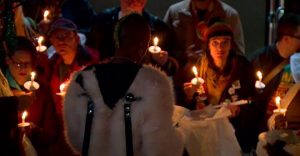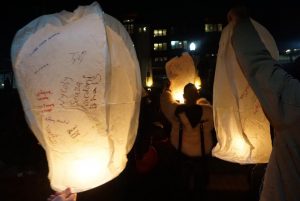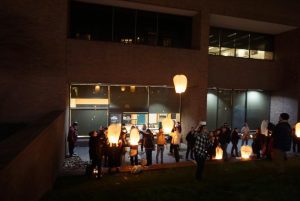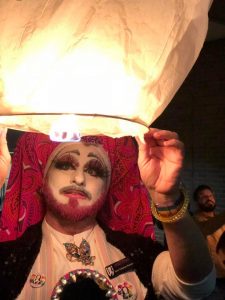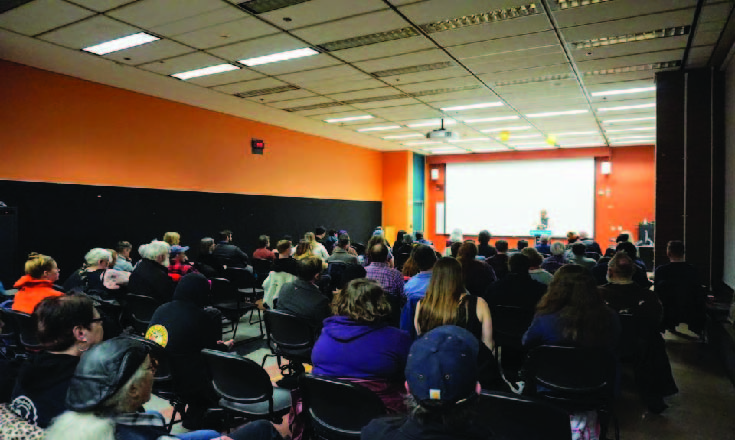The 20th of November marks the International Transgender Day of Remembrance (TDOR), a moment balanced at the end of the year amidst several of the most major of holidays, as the light slides into darkness and a general air of reflectiveness settles onto our collective consciousness. The holidays, for many people, can represent family and all the complications that go with it as well; for transgender people, those complications can be amplified, heightened, more severe. Many trans and other queer people go on to make their own families, connecting with others in the community to create support and structure after being denied the family they were born into. TDOR serves as a nexus for the friends and families, both blood and chosen, of transgender people to gather, remember, mourn, and celebrate the transgender lives that have been stolen by violence, prejudice, and hate.
The statistics and the details behind those statistics brought more than one in the crowd to tears.
This year, the Seattle Collegian’s very own Editor-in-Chief, Astro Pittman, saw a lack of organized TDOR events in the metro area and, rather than sitting by, decided to host one himself. SCC permitted access to one of the larger rooms in the Broadway-Edison building; QFC donated cupcak es and Starbucks supplied the coffee. At Pittman’s request, several members of the Seattle chapters of the Sisters of Perpetual Indulgence arrived, elevating the level of ceremony and fabulousness in the room by several orders of magnitude. In vibrant, flowing, sparkling, be-sequined robes and magnificent headdresses, eyeshadow carefully color-coordinated with beard pigments, the Sisters collectively played hierophant to a slowly increasing audience.
es and Starbucks supplied the coffee. At Pittman’s request, several members of the Seattle chapters of the Sisters of Perpetual Indulgence arrived, elevating the level of ceremony and fabulousness in the room by several orders of magnitude. In vibrant, flowing, sparkling, be-sequined robes and magnificent headdresses, eyeshadow carefully color-coordinated with beard pigments, the Sisters collectively played hierophant to a slowly increasing audience.
Arou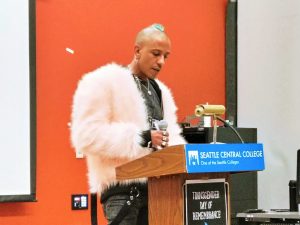 nd 6pm, Pittman took the podium; he welcomed everyone, spoke briefly on the circumstances that led him here and the history of the day and the creator of it: founded in 1999 by Gwendolyn Ann Smith, in response to and in memory of the murder of fellow transwoman Rita Hester. He spoke of the bigotry that the transgender community faces both nationally and internationally, particularly in Brazil, the systemic failures of society to protect them and the disproportionate rate of murder that transwomen of color in particular are subject to. The statistics and the details behind those statistics brought more than one in the crowd to tears.
nd 6pm, Pittman took the podium; he welcomed everyone, spoke briefly on the circumstances that led him here and the history of the day and the creator of it: founded in 1999 by Gwendolyn Ann Smith, in response to and in memory of the murder of fellow transwoman Rita Hester. He spoke of the bigotry that the transgender community faces both nationally and internationally, particularly in Brazil, the systemic failures of society to protect them and the disproportionate rate of murder that transwomen of color in particular are subject to. The statistics and the details behind those statistics brought more than one in the crowd to tears.
Pittman invited Seattle Police officer Jim Ritter to both attend and speak; an out gay man on the force and the official LGBTQ+ liaison of SPD, and with the assistance and input of the transgender community, Ritter leads educational programs for his fellow police officers. He spoke at length about the improvements made within the Seattle police department as well as on a national level, while acknowledging the hit-or-miss history police have historically had with queer and transgender groups and the progress that still needs to be made.
After Officer Ritter finished, Pittman’s friend A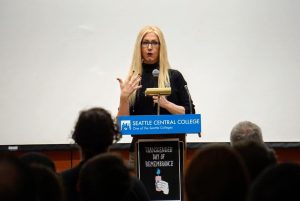 bby Oster described her experiences as a transwoman in Seattle, the challenges she has personally faced, her hopes for the societal progress that has been made, and her serious concern for the aggressively anti-trans policies put forth by current administration. She spoke about the risk of suicide amongst trans people, and the increased mental health risks, but also the joys of life. Blond and slender, Oster brought plenty of humor to an otherwise somber experience, her light voice carrying through the speaker system; world-wise and wry, clever, and ultimately optimistic. In the midst of remembering the dead she lit a flame for those still alive and looking for hope.
bby Oster described her experiences as a transwoman in Seattle, the challenges she has personally faced, her hopes for the societal progress that has been made, and her serious concern for the aggressively anti-trans policies put forth by current administration. She spoke about the risk of suicide amongst trans people, and the increased mental health risks, but also the joys of life. Blond and slender, Oster brought plenty of humor to an otherwise somber experience, her light voice carrying through the speaker system; world-wise and wry, clever, and ultimately optimistic. In the midst of remembering the dead she lit a flame for those still alive and looking for hope.
During the closing remarks, volunteers brought several slips of paper to each audience member  and each paper had a name, a location, and a date; the condensed details of a trans person killed this year. Most were women, many were from other countries. With the slips came instructions from Pittman, once more at the podium: in the back of the room were paper lanterns; write the names of the dead on the lantern so to be sent
and each paper had a name, a location, and a date; the condensed details of a trans person killed this year. Most were women, many were from other countries. With the slips came instructions from Pittman, once more at the podium: in the back of the room were paper lanterns; write the names of the dead on the lantern so to be sent 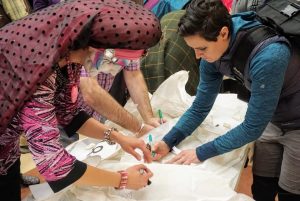 into the blackness of the sky, carried by flame, carried by grief, carried, most certainly, by love. To be remembered. To never be truly lost. To be carried, forever, in the perfection of memory. The Sisters passed out a rainbow of Sharpies, people crowding around tables to inscribe each transient, fragile paper vehicle with the hundreds of names given.
into the blackness of the sky, carried by flame, carried by grief, carried, most certainly, by love. To be remembered. To never be truly lost. To be carried, forever, in the perfection of memory. The Sisters passed out a rainbow of Sharpies, people crowding around tables to inscribe each transient, fragile paper vehicle with the hundreds of names given.
Outside, in the dark cold of a late November night, each lantern was lit, held aloft, and released, one by one, each one a glowing golden messenger bearing, in the handwriting of dozens of strangers, the names of people murdered for the crime of existing openly.
